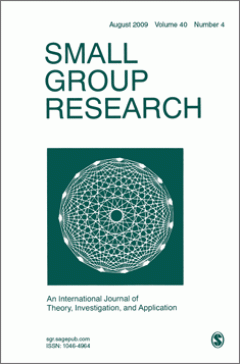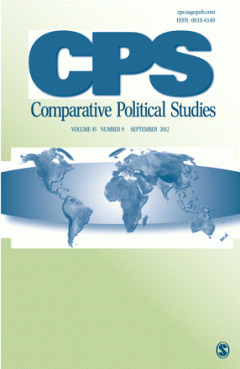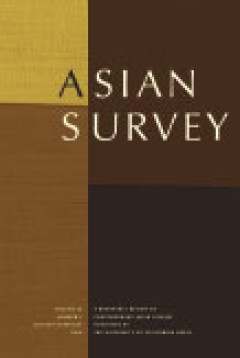Filter by

Public Meeting Facilitation : A Naïve Theory Analysis of Crisis Meeting Inte…
During the record 2009 flood, the city of Fargo, North Dakota, United States held daily televised public meetings. Unknown to many citizens, the city also held private premeetings to prepare for the public meetings. The present study examined city leaders� na�ve theories of meeting facilitation in light of a minimalist view of public meetings (McComas, 2001). Interviews of city leaders during a…
- Edition
- Vol. 43 no. 2, April 2012,pp. 211-235
- ISBN/ISSN
- 10464964
- Collation
- -
- Series Title
- Small Group Research
- Call Number
- -

Wasted Time and Money in Meetings : Increasing Return on Investment
Meetings are a significant investment for organizations and the groups that comprise them, but the small group literature has often neglected the direct study of meetings. This article closes the special issue on work meetings by exploring the costs associated with unnecessary or poorly facilitated meetings and proposes a three-stage model that groups and organizations may use to assure that th…
- Edition
- Vol. 43 no. 2, April 2012,pp. 236-245
- ISBN/ISSN
- 10464964
- Collation
- -
- Series Title
- Small Group Research
- Call Number
- -

Has the British Public Depolarized Along With Political Elites? An American P…
In contrast to the growing elite policy polarization in the United States, the British Labour and Conservative Parties have converged dramatically on economic and social welfare policy over the past two decades. The authors ask the following question: Has there been a parallel depolarization in the British mass public�s policy attitudes and partisan loyalties, pointing to a general mechanism th…
- Edition
- Vol. 45 no. 4, April 2012, pp. 507-530
- ISBN/ISSN
- 00104140
- Collation
- -
- Series Title
- Comparative Political Studies
- Call Number
- -

The United States and Asia in 2011 : Obama Determined to Bring America “Bac…
The Obama administration moved to stabilize 2010's deteriorating relations with China and exploit the opportunity to deepen ties with China's nervous neighbors. Diplomatic, economic, and security initiatives were melded to �rebalance� American resources and attention to Asia in the 21st century. Early 2011 euphoria about China's rise and gloom about America's decline began to reverse themselves…
- Edition
- Vol. 52, No. 1, Januari/February 2012, pp. 6-14
- ISBN/ISSN
- 00044687
- Collation
- -
- Series Title
- Asian Survey
- Call Number
- -

China in 2011 : Anger, Political Consciousness, Anxiety, and Uncertainty
This paper identifies major trends in China in 2011 and analyzes their implications. The past year has witnessed a continuous rise of anger among social groups, as demonstrated in various forms of social protests. Chinese intellectuals are becoming increasingly politically conscious and calling for political reform. However, the leadership is trapped in the politics of power succession; uncerta…
- Edition
- Vol. 52, No. 1, January/February 2012, pp. 28-41
- ISBN/ISSN
- 00044687
- Collation
- -
- Series Title
- Asian Survey
- Call Number
- -

Japan in 2011 : Cataclysmic Crisis and Chronic Deflation
Japan's government under the Democratic Party of Japan has limped along for another year, hampered by a divided legislature and an aging population reluctant to pay for the pensions and services it requires. The natural disasters of March 2011 were a tragic sideshow to the deep political problems that continue to plague Japan.
- Edition
- Vol. 52, No. 1, January/February 2012, pp. 15-27
- ISBN/ISSN
- 00044687
- Collation
- -
- Series Title
- Asian Survey
- Call Number
- -

Russia and the CIS in 2011 : Uncertain Economic Recovery
During 2011, Russia made progress in recovering from the global financial crisis and moved toward further political centralization. Moscow also continued to prepare for an uncertain new world by pursuing pragmatic relations with Western and non-Western powers and by seeking to increase its influence among the states of the Commonwealth of Independent States.1
- Edition
- Vol. 52, No. 1, January/February 2012, pp. 42-51
- ISBN/ISSN
- 00044687
- Collation
- -
- Series Title
- Asian Survey
- Call Number
- -

Women producers and the benefits of collective forms of enterprise
This article summarises the findings of an action research project examining the experience of women producers in various collective enterprises, all linked to the Fair Trade movement, in seven countries in Asia, Africa, and Latin America. What are the benefits of collective enterprise for women producers? The study found that participating in collective forms of enterprise and linking to Fair …
- Edition
- Volume 20, Issue 1, March 2012, pp. 13-32
- ISBN/ISSN
- 13552074
- Collation
- -
- Series Title
- Gender & Development
- Call Number
- -

Shampoo, saris and SIM cards : seeking entrepreneurial futures at the bottom …
In recent years bottom-of-the-pyramid (BoP) models have emerged as a popular strategy for offering poor women the opportunity to earn an income by distributing goods and services door-to-door. In this article, we explore one recent example of BoP entrepreneurship: the CARE Bangladesh Rural Sales Program (RSP). The RSP is a partnership between CARE and several multinational and domestic companie…
- Edition
- Volume 20, Issue 1, March 2012, pages 33-47
- ISBN/ISSN
- 13552074
- Collation
- -
- Series Title
- Gender & Development
- Call Number
- -

Workers' rights and corporate accountability – the move towards practical, …
Women workers across Asia and throughout the world continue to face long hours, low wages and discrimination when they try to organise into unions within garment and footwear factories. Millions of young women are making products for companies Nike and Adidas. Over the past decade, under considerable public pressure, these companies have developed standards on workers conditions for their suppl…
- Edition
- Volume 20, Issue 1, March 2012, pages 49-65
- ISBN/ISSN
- 13552074
- Collation
- -
- Series Title
- Gender & Development
- Call Number
- -

Women's entrepreneurship development initiatives in Lebanon : micro-achieveme…
In the aftermath of the Lebanese civil war, as part of their efforts to rebuild the national economy, many donor agencies and non-government organisations increased their efforts to support the goal of women's economic empowerment. However, the share of women-owned businesses in Lebanon has remained low, and women are mostly still limited to work in marginalised sectors of the economy where pro…
- Edition
- Volume 20, Issue 1, 2012, March 2012, pages 67-80
- ISBN/ISSN
- 13552074
- Collation
- -
- Series Title
- Gender & Development
- Call Number
- -

The Markets for Afghan Artisans approach to women's economic empowerment
This article describes the Markets for Afghan Artisans (MFAA) programme, delivered by Afghan non-government organisation, Zardozi, which has developed an effective approach to facilitating market access for very poor women in the informal, handcrafted garment industry, successfully addressing the multiple barriers faced by women, and developing full business cycle support, customised to their s…
- Edition
- Volume 20, Issue 1, 2012, March 2012, pages 81-94
- ISBN/ISSN
- 13552074
- Collation
- -
- Series Title
- Gender & Development
- Call Number
- -

Show the world to women and they can do it: Southern Fair Trade Enterprises a…
This article draws on research with women handicraft producers in Bangladesh in order to analyse processes of empowerment. It explores the practices and social relationships embedded in the activities of four Southern Fair Trade Enterprises (SFTEs). Attention is drawn to the kinds of change which the women producers feel they are achieving and how such change was linked to Fair Trade employment…
- Edition
- Volume 20, Issue 1, 2012, March 2012, pages 95-109
- ISBN/ISSN
- 13552074
- Collation
- -
- Series Title
- Gender & Development
- Call Number
- -

Fair Trade and organic certification in value chains : lessons from a gender …
Fair Trade and organic certification production of coffee and other commodities is popularly seen as beneficial to producers in many ways. However, gender analysis of Fair Trade is important for assessing the gains and losses for women and men specifically, which result from compliance with globally set codes of conduct. This article presents a case study of coffee production and trade in Ugand…
- Edition
- Volume 20, Issue 1, 2012, March 2012, pp 111-127
- ISBN/ISSN
- 13552074
- Collation
- -
- Series Title
- Gender & Development
- Call Number
- -

Beyond participation: making enterprise development really work for women
Oxfam has been involved in sustainable livelihoods and enterprise development since the 1960s, gaining practical experience in setting up businesses that deliver social as well as economic development. Since we believe that gender inequality is one of the greatest barriers to poverty eradication worldwide, over the last three years we have been piloting an innovative Enterprise Development Prog…
- Edition
- Volume 20, Issue 1, 2012, March 2012, pp 129-144
- ISBN/ISSN
- 13552074
- Collation
- -
- Series Title
- Gender & Development
- Call Number
- -

Expanding women's role in Africa's modern off-grid lighting market : enhancin…
Women in Africa are both important beneficiaries and key facilitators of the modern off-grid lighting revolution. Affordable products using technologies like micro-solar power and light-emitting diodes (LEDs) can replace fuel-based lighting � enabling women and men to save money, reduce indoor pollution, and operate their small enterprises with reliable, clean lighting. This article discusses n…
- Edition
- Volume 20, Issue 1, 2012, March 2012, pp 145-157
- ISBN/ISSN
- 13552074
- Collation
- -
- Series Title
- Gender & Development
- Call Number
- -

The media and the irony of politically serious situations : consequences of t…
This article discusses the connections between political conflicts and situational irony and their relationship to the media. The focus is on a continuum of ironic events that started from the crisis following the publication of the Muhammed cartoons in the Danish newspaper Jyllands-Posten, which led to a satirical comic strip being published on the web pages of Kaltio, a small cultural journal…
- Edition
- Vol. 34 no. 2, March 2012,pp. 131-145
- ISBN/ISSN
- 01634437
- Collation
- -
- Series Title
- Media Culture Society
- Call Number
- -

Gendered media, changing intimacy : internet-mediated transnational communica…
This article explores the ways in which migrants use the internet to maintain family relationships and how the difference in digital knowledge and skills between men and women serves to transform the power dynamics in the family sphere transnationally. It examines the intersection of the research areas of transnationalism, digital inequality and family. While the discussion of digital inequalit…
- Edition
- Vol. 34 no. 2, March 2012,pp. 146-161
- ISBN/ISSN
- 01634437
- Collation
- -
- Series Title
- Media Culture Society
- Call Number
- -

Analysing national practices after European state aid control : are multi-sta…
This article analyses the increasing emphasis on multi-stakeholder approaches in the development of public broadcasting policies. The European Commission, in particular, reinforces this trend, having pointed to the necessity of �third parties� being involved in procedures that allow public broadcasters to expand activities to new media markets. The article�s research question is twofold. First,…
- Edition
- Vol. 34 no. 2, March 2012,pp. 162-180
- ISBN/ISSN
- 01634437
- Collation
- -
- Series Title
- Media Culture Society
- Call Number
- -

New ways of consumption : the audiences of public service media in Italy and …
The digital transformation of the broadcasting industry forces public service broadcasting (PSB) companies to restructure and rethink their offerings. Characteristic today is a keener attention to the preferences and behaviours of audiences, and the importance of the link between the concept of public service and the role of audience participation. PSB companies are engaged in a reconsideration…
- Edition
- Vol. 34 no. 2, March 2012,pp. 181-194
- ISBN/ISSN
- 01634437
- Collation
- -
- Series Title
- Media Culture Society
- Call Number
- -
 Computer Science, Information & General Works
Computer Science, Information & General Works  Philosophy & Psychology
Philosophy & Psychology  Religion
Religion  Social Sciences
Social Sciences  Language
Language  Pure Science
Pure Science  Applied Sciences
Applied Sciences  Art & Recreation
Art & Recreation  Literature
Literature  History & Geography
History & Geography